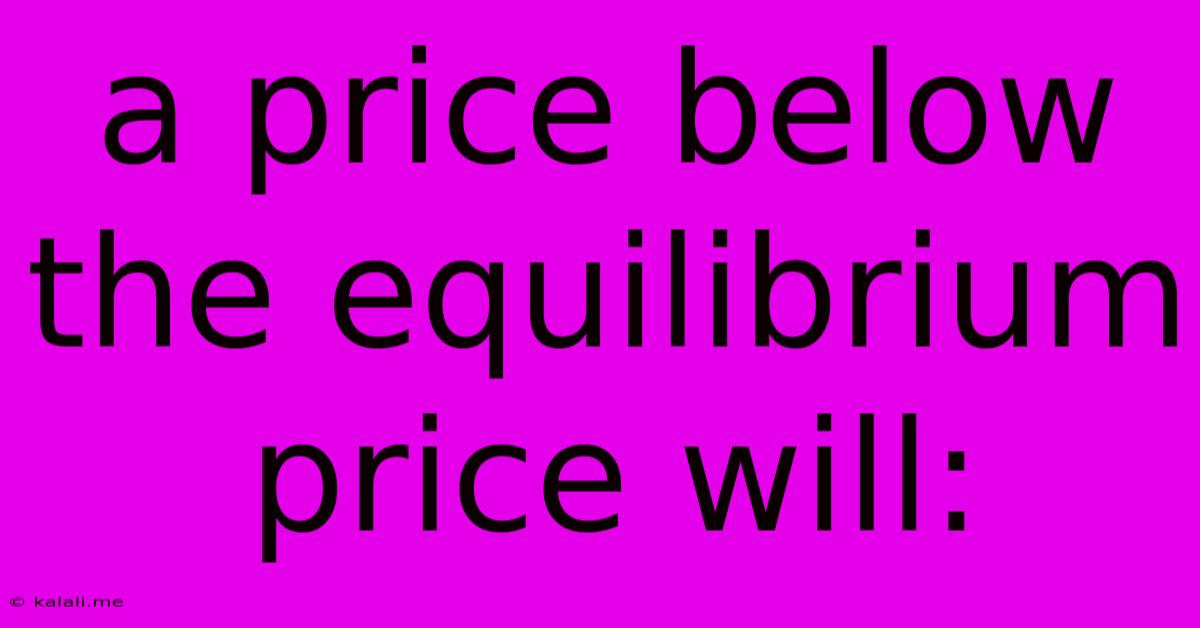A Price Below The Equilibrium Price Will:
Kalali
Jun 16, 2025 · 3 min read

Table of Contents
A Price Below the Equilibrium Price Will: Create a Shortage and Drive Up Prices
In the bustling marketplace of supply and demand, the equilibrium price represents the sweet spot where the quantity demanded by consumers perfectly matches the quantity supplied by producers. It's the price point where the market clears, leaving no excess supply or demand. However, what happens when a price is artificially set below this equilibrium point? Let's delve into the consequences.
A price below the equilibrium price will lead to a shortage. This is a fundamental principle of economics. When the price is artificially lowered, consumers will want to buy more of the good or service than producers are willing to supply at that reduced price. This discrepancy creates a gap between the quantity demanded and the quantity supplied, resulting in a shortage. Think of it like this: if the price of gasoline suddenly dropped to $0.50 a gallon, everyone would want to fill up their tanks multiple times, while gas stations wouldn't have enough supply to meet this drastically increased demand.
Understanding the Mechanics of a Shortage
Several factors contribute to the formation of a shortage when prices are below equilibrium:
- Increased Demand: A lower price naturally stimulates greater demand. Consumers are more inclined to purchase a good or service when it's cheaper, often leading to increased consumption.
- Decreased Supply: Conversely, producers may be less willing to supply the good or service at a lower price. Their profit margins are squeezed, potentially leading them to reduce production or even exit the market entirely. This is particularly true in competitive markets where producers can choose to allocate resources to more profitable ventures.
- Longer Queues and Waiting Lists: The heightened demand coupled with reduced supply often manifests as longer queues, waiting lists, and rationing. Consumers might have to wait for extended periods to acquire the product or service.
- Black Markets: In extreme cases, the shortage could lead to the emergence of black markets, where the good or service is sold illegally at prices significantly higher than the artificially imposed low price.
The Market's Self-Correcting Mechanism
While government intervention or other external factors might temporarily maintain a price below equilibrium, the market inherently possesses a self-correcting mechanism. The shortage created by the low price will eventually force the price upwards. As consumers compete for the limited supply, they'll be willing to pay more, driving the price closer to the equilibrium point. This upward pressure on price will continue until the quantity demanded equals the quantity supplied, restoring market equilibrium.
Examples of Price Controls Below Equilibrium
Historically, governments have attempted to implement price controls, often setting prices below the equilibrium level. These attempts are frequently made with good intentions – for instance, to make essential goods more affordable for low-income households. However, these policies often backfire, leading to the very shortages they aim to prevent. Examples of this include price controls on rent or essential goods during times of crisis.
In conclusion, a price below the equilibrium price is unsustainable in a free market. It will inevitably lead to a shortage, creating various challenges including longer queues, rationing, and the potential for black markets to emerge. The inherent market mechanisms will eventually push the price back towards equilibrium, demonstrating the powerful forces of supply and demand.
Latest Posts
Latest Posts
-
How To Create Clickable Image In Html
Jun 16, 2025
-
What Are The Factors Of 121
Jun 16, 2025
-
What Is A Theme Of The Passage
Jun 16, 2025
-
A Company That Provides Access To The Internet
Jun 16, 2025
-
Which Word Is Closest In Meaning To The Underlined Word
Jun 16, 2025
Related Post
Thank you for visiting our website which covers about A Price Below The Equilibrium Price Will: . We hope the information provided has been useful to you. Feel free to contact us if you have any questions or need further assistance. See you next time and don't miss to bookmark.